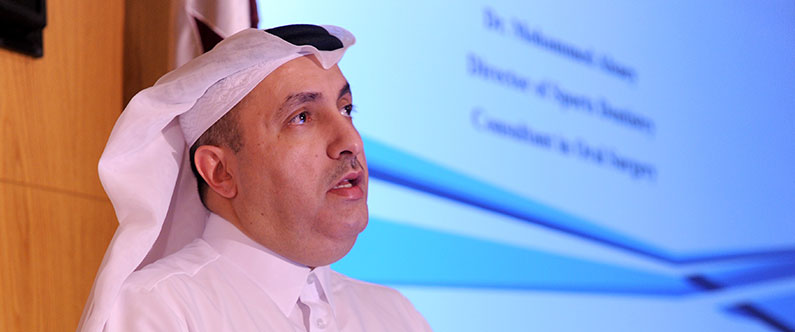WCM-Q Grand Rounds hears from sports dentistry expert
 Elite athletes are extremely vulnerable to oral trauma while competing, explained Dr. Mohammed Jaber Alsaey of Aspetar Orthopaedic Hospital in his presentation at WCM-Q’s Grand Rounds.
Elite athletes are extremely vulnerable to oral trauma while competing, explained Dr. Mohammed Jaber Alsaey of Aspetar Orthopaedic Hospital in his presentation at WCM-Q’s Grand Rounds.
Preventing and managing oral injuries in elite sportspeople was discussed as healthcare professionals from across Qatar convened for the latest installment of WCM-Q’s Grand Rounds.
Dr. Mohammed Jaber Alsaey, director of sports dentistry and consultant oral surgeon at Aspetar Orthopaedic Hospital, explained the most common types of oral injuries that are sustained by elite athletes, how and when to administer immediate dental care in the field, and how to reduce the risk of serious injury with specialist protective equipment and regular physical examinations.
“In many sports the mouth is one of the most exposed and vulnerable areas of an athlete’s body,” said Dr. Alsaey. “Oral trauma can be acutely painful and can force athletes to withdraw from competition immediately and can keep them out for a long time. If not treated promptly and correctly oral trauma can lead to long-term dental problems that will impact the athlete’s quality of life and career. Therefore, sports dentistry is emerging as an important branch of dentistry to address the prevention and treatment of oral injury in sports.”
As part of its world-class sports medicine program, Aspetar has emerged as one of the leading centers of sports dentistry in the Middle East. Dr. Alsaey explained that a key element of sports dentistry is being able to make swift and accurate diagnoses in the sports arena in order to administer appropriate care without delay. This is particularly important with avulsion of a tooth, which is when the tooth has been completely knocked out of the oral cavity.
Dr. Alsaey said: “The tooth can be rescued by following a few simple steps and by having the right equipment available. Firstly, the tooth must be picked up by the crown, never by the root. It must then be placed in milk or in a special preserving fluid designed for the purpose. If this is not possible the tooth should be gently reinserted into the oral cavity or placed in the patient’s mouth between the gum and the cheek. The patient should then be taken to a dental office as soon as possible.”
Dr. Alsaey also spoke about soft tissue injuries to the lips and gums, fractures of the upper and lower jaw, damage to the temporomandibular joints which connect the jaw to the skull, and various types of injury to the teeth.
For sports teams that travel to remote locations to take part in competitions, professional medical care can sometimes be difficult to access, said Dr. Alsaey. As such, Dr. Alsaey and his colleagues at Aspetar provide oral trauma training to team physios and doctors, and have created their own custom-made dental emergency kit containing vital instruments and equipment. Aspetar is also able to create custom-made mouth guards for athletes, which are regarded as the most effective means of reducing the risk of serious injury through oral trauma. In addition, Dr. Alsaey said that regular examination of athletes is important to detect existing conditions such as abscesses, which could become infected if not treated or which could be aggravated by trauma.
WCM-Q professor of medicine Dr. Stephen Atkin said: “We were delighted to hear about this fascinating branch of dentistry and WCM-Q is very grateful to Dr. Alsaey for sharing his expert knowledge with us.”